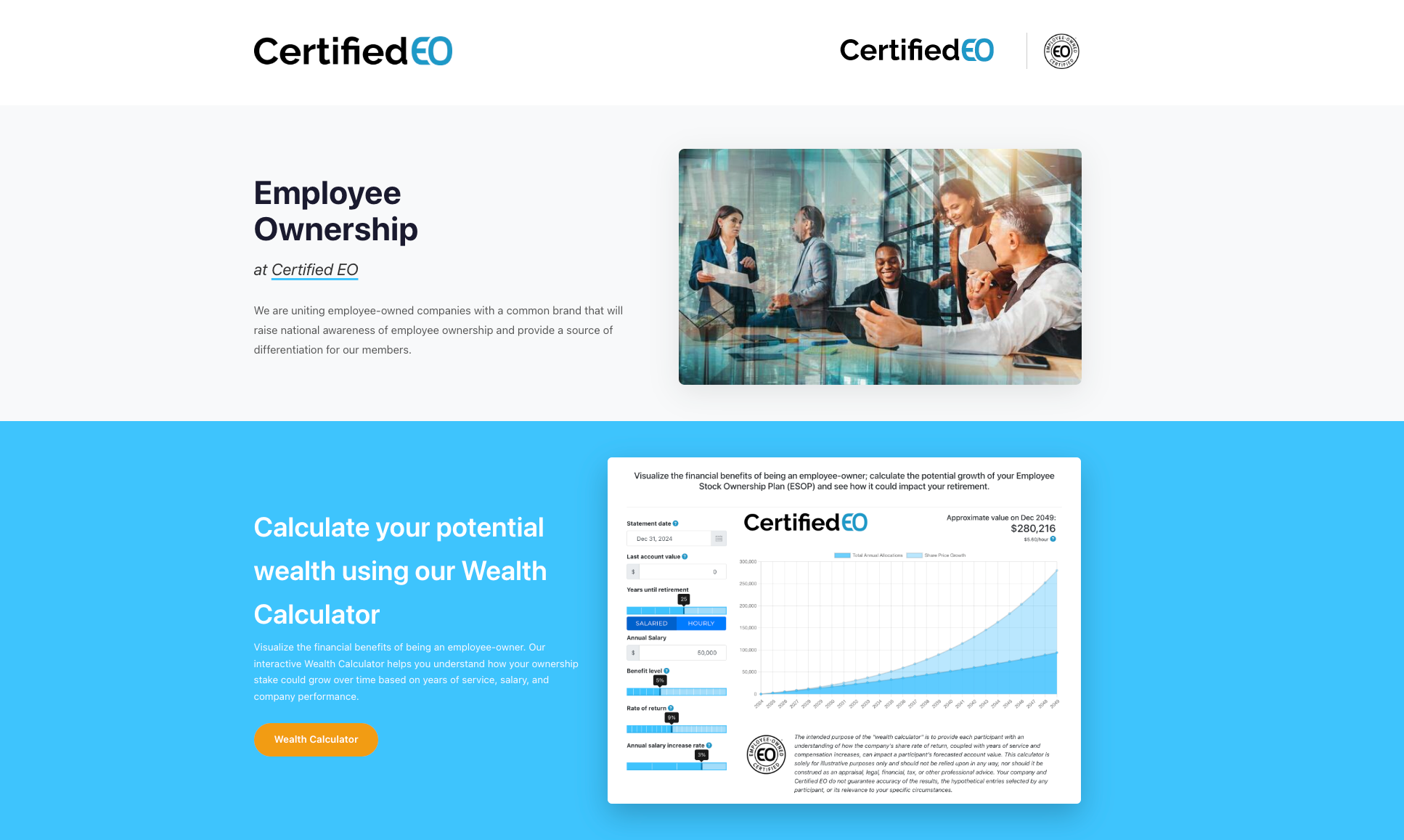
Employee ownership is an exciting idea that has the potential to address some of our country’s biggest challenges. By changing the relationship between company and employee, employee ownership helps workers build wealth, creates a better day-to-day environment for employees, and makes companies more successful.
But the employee ownership community also faces challenges that impeded our growth. Employee ownership can be confusing and hard for people to understand. Worse, the goodwill that we have created is threatened by pretenders because any company can call themselves employee-owned.
By setting a standard that people know and trust, Certified EO plays a unique role in helping our community overcome these issues. By making employee ownership easy to understand, building trust, and protecting our goodwill, certification benefits everyone in the employee ownership (EO) community including companies, trade organizations, lobbying groups, research hubs, state centers, service providers, and most importantly employee-owners.
Certification Makes Employee Ownership Easy to Understand
The details of employee ownership can be confusing to insiders, let alone someone with no prior knowledge. There are many different structures - ESOPs, Worker Cooperatives, Employee Ownership Trusts, and Direct Share Ownership - each with their own nuances. For example, ESOPs have allocations, contributions, vesting, valuation, distributions, and forfeitures. From a technical point of view the details are critical, but for most people they are overwhelming.
Certification makes employee ownership easy to understand. Our standard of significant, broad-based employee ownership is a yardstick that applies across all structures and boils employee ownership down to the basics:
- Ownership: at least 30% of the company must be owned by employees (excluding founders).
- Access: reasonable access to ownership must be open to every employee.
- Concentration: employee ownership must not be too concentrated.
These simple concepts help people understand if they’re aligned with our community in terms of basic principles. It also helps companies communicate this alignment with an easy-to-recognize mark. And it resonates! Last year we ran a nationally-representative opinion poll and found that 25% of Americans would be more likely to apply to a job if the description had our certification mark.
Certification Builds Trust
People understand third-party certification. There are many examples of successful certifications across the United States: Great Place to Work, Made in America, USDA Organic, Fair Trade, and Veteran- and Women-Owned Businesses. Certifications are a familiar concept that help people understand whether a company’s claims are potentially misleading or indeed truthful.
The independent validation of third-party certification builds confidence, especially with people who are unfamiliar with employee ownership. It can help job seekers, new hires, existing employee-owners, clients, customers, purchasing agents, and government officials trust that EO is truly as good as it sounds. For example, when a manager is explaining the wealth-building potential to a skeptical new hire, it helps to say, “you don’t have to take my word for it, we’re certified.”
The rigor of our process amplifies the trust-building. Just 1 in 200 American companies qualify for Certified Employee-Owned. We have worked with academics to verify that 30% employee ownership would transform the lives of tens of millions of Americans. And we conduct a comprehensive review of every new Member. All these efforts pay off in trust and confidence.
Certification Protects Our Goodwill
As employee ownership becomes more well-known, our community will face a major issue: anyone can call themselves employee-owned. Maybe the CEO is the sole owner and they claim that they are also an employee, so technically their company is 100% employee-owned. Or maybe a company that has distributed 1% of shares across all employees starts talking about their employee ownership. Afterall, every employee is also an owner. You might be think these claims are absurd, but unfortunately we’ve already come across companies making such misleading statements.
These examples show there is a lot of gray area around what it means to be employee-owned. This creates the possibility for the employee ownership equivalent of “greenwashing” and it will become more common as awareness of this amazing idea continues to grow. Impersonators damage the concept of employee ownership and, if left unchecked, will create negative opinions and impressions that do irreversible damage.
As a community, we must defend our goodwill before it is diluted to the point of being meaningless. Aligning around a common standard with a clear and rigorous process and building a common brand will help fend off pretenders. Goodwill is an amazing asset, but it is fragile and we must protect it with certification.



